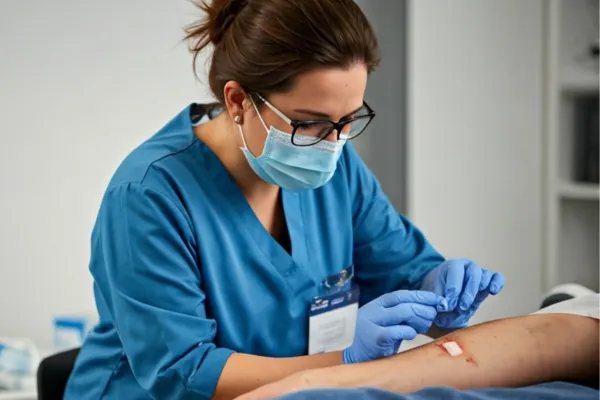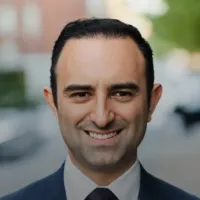In-Clinic Wound Care Services
Expert Wound Management in a Safe, Sterile Environment
In-clinic wound care offers patients a higher level of treatment that goes beyond what can be managed at home. With access to specialized equipment, advanced therapies, and a dedicated wound care team, patients receive personalized care tailored to their specific wound type and medical history.
Regular in-clinic visits allow for close monitoring, faster adjustments to treatment plans, and early detection of complications—leading to quicker healing and fewer hospital visits. For patients seeking expert care in a safe, professional setting, in-clinic wound care provides peace of mind and better outcomes.
Why Choose In-Clinic Care?
Sterile
Setting
Controlled environment to minimize risk of infection.

Advanced Equipment
Access to diagnostic tools and specialized wound care
technology.

Integrated Care
Opportunity to manage underlying conditions
and your wound in one office visit.

Ongoing Monitoring
Consistent follow-ups and progress tracking for faster healing.

Immediate Access to Care
Faster procedure, consultation, and treatment access without mobile or home service delays

About Wound Care Awareness
This annual campaign began in 2014 when we recognized that nearly 7 million
Americans have a non-healing wound. Lack of awareness leads to fewer screenings,
limited interventions and wounds that can progress to severe complications or even
amputation.

Top Wound Care Provider Los Angeles: Find Your Best Fit
Wound Care Provider Los Angeles
Choosing the right wound care provider in Los Angeles is important. It’s not just another medical choice. It is a big step that can help a patient feel better, heal faster, and have a better life. You might need help in a skilled nursing facility (SNF), rehab center, or at home. In any of these places, what the wound care provider knows, the tools they use, and how they work with you matter a lot for healing.
This guide will help you understand what to look for when choosing wound care providers. It talks about the most important things to check in wound care specialists. We will also look at both medical and personal care. These are key for good recovery and can make healing safer, faster, and more complete, whether it be in skilled nursing or at home.
Related: How Royal Wound Care Reduces Hospital Readmissions
Skilled Nursing Facility Wound Care Partner: Why Qualifications Matter
When you are looking at a wound care provider for skilled nursing facilities or long-term care, start by checking their certifications. The best wound care professionals often have certificates from trusted groups. Some examples are the Wound, Ostomy, and Continence Nursing Certification Board (WOCNCB) and the American Board of Wound Management (ABWM). A few may have certificates from other well-known organizations. If they have these, it shows they are trained in wound assessment and infection control. It also means they know which dressing to use and can handle the most complex wound healing methods. These things are important when it comes to skilled nursing, wound healing, and overall wound care.
Hands-on experience is just as important as having certification. Providers who have managed many kinds of wounds, like pressure ulcers, diabetic wounds, and surgical site care, bring strong clinical judgment to the job. They can notice problems early, change treatment plans fast, and make sure there is good continuity of care. Having experience with training matters a lot in SNFs, because patients there often have several chronic conditions that need careful care.
Mobile Wound Care Services for Nursing Facilities: Flexibility That Supports Healing and Medicare
Many places now use mobile wound care services to give bedside care. This is very helpful for people who are bedridden or have trouble with mobility. The mobile wound care team comes into the facility and gives advanced wound care right at the bedside. This way, there is less disruption, and good care standards are still met.
In these mobile settings, patients get full checkups and care where they are. They have their dressing changed to fit their needs, any dead tissue taken off if needed, and follow-up visits made. This all happens without the stress of having to go anywhere.
For SNFs and rehab centers, working with a mobile wound care provider means patients get steady and expert care for their wounds, even if it is not possible for them to come to a clinic.
This bedside approach makes it easier for people to follow treatment plans and feel comfortable, while also helping with wound management. It keeps everything in line with Medicare rules for billing and paperwork, which is very important for the facility administrators.
Wound Care Specialists for Rehab Centers: Advanced Methods for Faster Recovery
Rehabilitation centers take care of many people after surgery or an injury. People like this can get pressure injuries or infections at the surgical site. A person might also get wounds from being in bed or not moving much. That is why it is so important to have wound care specialists at these places. They know a lot about wound care and help people in rehab heal in the right way. Good healing often depends on getting the right support from these trained wound care experts.
Specialists in this place often use new tools, like thermal imaging, to find poor blood flow. They also use pressure mapping tools. These help them change bed or wheelchair surfaces and stop more damage to body tissue. The new tools do not need surgery or needles. They let people see problems early and help the treatment be more effective. This way, outcomes for people get much better.
The right provider will look at more than just the wound. A good plan for wound management thinks about the patient’s movement, what they eat, and their health in general. The way a provider uses this whole-person care is what sets apart quality providers from just basic wound treatment.
SNF Wound Care
Skilled Nursing Facilities (SNFs) play a crucial role in wound care management for elderly or post-operative patients. Wound care in SNFs involves a multidisciplinary approach, with healthcare professionals such as nurses, doctors, and physical therapists working together to ensure proper treatment and healing of wounds. This may include regular wound assessments, appropriate dressing changes, infection control measures, and implementing specialized treatments like negative pressure wound therapy.
Moreover, SNFs focus not only on treating existing wounds but also on preventive measures to reduce the risk of developing new wounds. This can involve implementing mobility programs, turning schedules for bed-bound patients, maintaining proper nutrition to support healing, and educating both patients and caregivers on skin care practices.
Additionally, staying up-to-date with the latest wound care techniques and technologies is essential for SNFs to provide the best possible care for their residents. Continuous training and education for staff members on evidence-based practices in wound assessment and management are vital to ensuring positive outcomes for patients requiring wound care services in SNF settings.
How to Choose the Best Wound Care Company for Nursing Facilities
When you pick a wound care company for a skilled nursing place, it is good to ask the right questions. Does the company often help Medicare patients? Are their nursing staff trained in wound management? Do they give bedside care, or do people have to go to a clinic?
The best wound care companies plan their services to fit what your place needs. They help your staff learn and feel ready to do the work. They also give care teams full records to help make the care better. These companies check in often to stop wounds from getting worse or coming back. A good company gives you real-time updates so that you can talk with the provider. That way, you can change care plans right away if healing slows or new problems come up.
Make sure to read client testimonials and look at past case studies. You should also check any data about patient outcomes that is there. A strong wound care partner is open about what they do. They have good clinical skills. They also like to work together with others. These things show their quality and can help you feel better about choosing them.

Factors to Consider When Selecting a Wound Care Partner
A few important things can help you find a good wound care provider in Los Angeles. First, look at how fast they respond. A local wound care provider can quickly help you if you see signs of infection or if your treatment plan needs to change. Second, think about how often you see the same person. A provider who sees you often gets to know you and your wound. They spot small changes in your wound care and can act fast.
Third, you need to look at how much the provider knows about Medicare and SNF details for the paperwork. If they do not follow the rules, it can cause claims to get denied or money problems. A good wound care company will handle all of this for you, so you can be sure that the patient's care comes first, and you will not have to worry about these issues with Medicare or your SNF.
In the end, see if they care about teaching. Do they give training or in-service sessions for your staff? This shows that they are not only about treating wounds. They also want to help stop them from happening.
What to Look for in a Wound Care Service for Skilled Nursing Facilities
A wound care service needs to be like an extra part of your care team. They should give you clear wound measurements, keep good charts, take photos, and talk often with doctors. Make sure they use an EHR system or have secure updates online. When the notes are well done, it can help people heal faster, lower the risk of going back to the hospital, and keep families up to date.
The provider needs to know how to deal with wounds that often show up in SNFs. These can be pressure ulcers, arterial wounds, venous stasis ulcers, and surgical wounds. You should ask what kinds of treatments they use for these wounds. Some ways to treat these are hydrocolloids, alginates, foam dressings, and negative pressure therapy. It is also a good idea to ask how they choose the right option to fit each person’s needs.

Top Mobile Wound Care Solutions for Rehabilitation Centers in Los Angeles
In Los Angeles, mobile wound care providers are helping people move from the hospital to recovery. They come to rehab centers and SNFs with all the tools needed. This way, they give people advanced wound care wherever they are. With the right care in place, they help lower complications. They also help people heal faster and feel better over time. Mobile wound care brings healing to you, so you do not need to wait or travel far for the help you need.
These teams often work closely with physical therapists, dieticians, and primary care doctors to give complete wound care. They make sure everyone is on the same page for the care each person gets. They also focus on being able to connect with people from different backgrounds and know about the many health needs that come up in LA’s many neighborhoods.
With wound specialists who are trained in new ways, today’s mobile care is a big part of how people heal in rehab. They use advanced dressing methods, watch over the healing with telehealth, and sometimes use laser or oxygen treatments. All these tools can help with the healing and make care better for every person. Mobile care helps many people get the right dressing and support they need.
The Role of Technology in Wound Healing and Bedside Innovation
Today, wound care uses a lot of data. The use of thermal imaging helps find small changes in temperature near wounds. This can show signs of infection or swelling before you even feel the symptoms. Pressure mapping tools let people spot spots where there is too much force. This helps doctors give advice on how to adjust your bed or wheelchair. These small changes help stop pressure ulcers from showing up. This way, people get better care, and problems are caught early.
Advanced dressings with special compounds to fight germs or hold in moisture help the wound bed heal. People do not need to change these dressings very often. These dressings be helpful in places covered by medicare. In these places, stopping patient worry and working fast be very important.
At the bedside, these wound care technologies help doctors and nurses give better care. They make it easier to find problems, care for each person in their own way, and help the patient feel more comfortable. A patient could be in a rehab center, an SNF, or at home. With these new wound care tools, healing can go faster. These tools also lower the risks that come with wounds.
Related: Royal Wound Care At Home: A Nurse’s Step-by-Step Checklist
Conclusion: Healing Starts with the Right Wound Care Provider
Finding the right wound care provider in Los Angeles is not only about ticking off a list. It is about picking a team that knows both the science and feelings behind wound care. A good team with the right care skills knows how people feel and helps the whole community stay healthy. You might work in skilled nursing, run a rehab place, or care for someone in your own home. No matter what you do, the way you choose a wound care team now will shape how well people get better later.
When you focus on things like certification, experience, bedside access, and new tools, you help make sure patients get good care. This care is not just effective. It is given with respect for them. At Growth Partners Medical Services, we have a team that is ready to meet these high standards and even go beyond. We offer a wide range of wound care options. These options are made to fit what you need.
Looking for a wound care partner in Los Angeles?
We offer Medicare-compliant mobile bedside wound care. Our team also helps with advanced dressing management. We work together with skilled nursing facilities, rehab centers, and those in in-home care.
Contact us today for a free talk and a care plan made just for you.
Frequently Asked Questions
What types of services do wound care providers in Los Angeles typically offer?
Wound care providers in Los Angeles typically offer a range of services, including specialized wound assessments, debridement, advanced dressings, and infection management. They also provide patient education on wound care techniques and nutritional support to promote healing, ensuring comprehensive management for various types of wounds.
How can a specialized wound care provider improve healing outcomes?
A wound care provider in Los Angeles helps people heal by making treatment plans that fit each person’s needs. They use new therapies and give skilled advice. They know how to take care of complex wounds, and this means patients get the best care. It helps to lower the chance of infection and helps healing go faster. In the end, these wound care providers help people feel better and heal well.
What should I look for in a wound care provider in Los Angeles?
When you look for a wound care provider in Los Angeles, it is good to check their skills and background. See if the provider has the right training and if they have been doing this kind of work for some time. Make sure they understand wound care for things like chronic wounds, surgical wounds, and diabetic ulcers. A good provider knows how to look at and take care of a wound. They can also find signs of infection right away. This helps the provider give you quality wound care. It means people get better and feel good about the results.
Resources for People with Non-Healing Wounds
Your ability to heal can be affected by diabetes, heart disease, cancer or other immune-compromising health conditions.
Learn more about who is at risk and how to prevent wounds with our educational resources.
WEST HILLS
7230 Medical Center Dr. Suite 100
West Hills, CA 91307
(818)–660–2977
BEVERLY HILLS
9735 Wilshare Blvd #210B
Beverly Hills, CA 90212
(818)–660–2977
If you are interested in making an appointment, please click here to find a Wound Care Center near you.
Request an Appointment at a Royal Wound Care Facility near you.
Royal Wound Care is the expert in wound healing. Our board-certified wound care specialists are ready to help you begin your healing journey. Click the button below to request an appointment at a Wound Care Center near you—no referral needed
© 2025 Royal Wound Care, LLC. All rights reserved.
site by Growth Partners Marketing

